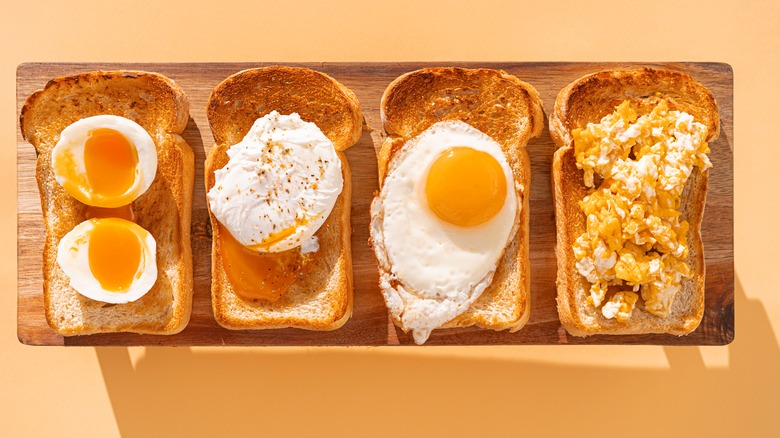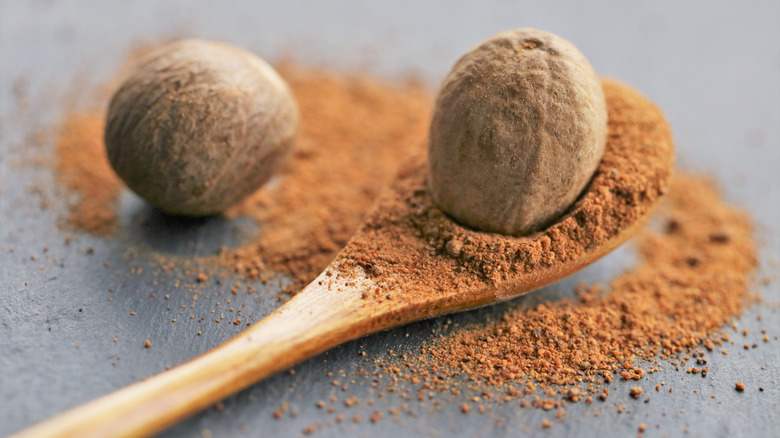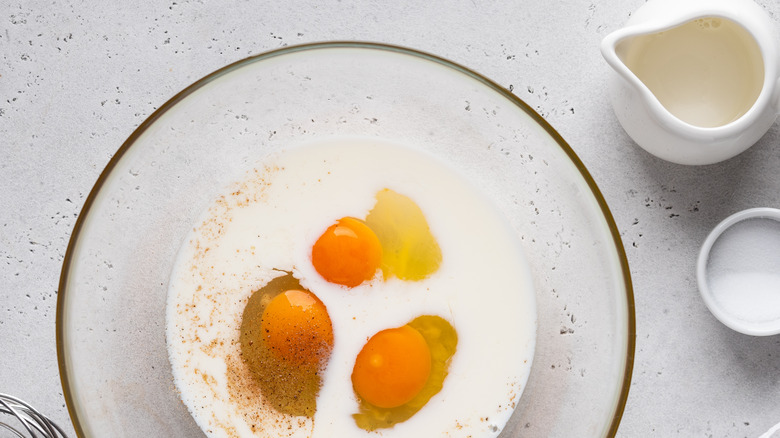Nutmeg Is The Secret Ingredient For More Flavorful Eggs
Sourced from the seed of an almost peach-like fruit, nutmeg is a spice with aromatic powers that can elevate any baked delicacy. When you think of nutmeg, your favorite pumpkin spice latte or sweet potato pie recipe probably comes to mind. However, did you know it also complements savory items like eggs?
Essentially, the spice emits a warm, nutty, almost sweet flavor that pairs perfectly with any egg dish. Whether you are preparing a classic quiche, baked eggs, or a rustic frittata, the inclusion of nutmeg provides the perfect touch to enhance the creaminess of your eggs. For a fancy breakfast, melt butter or a neutral oil over low heat, then add crushed garlic, eggs, and cream. Scramble the eggs with a whisk –then top them with salt, pepper, and a pinch of freshly ground nutmeg. You could also incorporate this secret ingredient into your go-to deviled eggs recipe or even your favorite egg salad. We're not the only ones who appreciate this combination. The late Queen Elizabeth enjoyed her perfectly cooked scrambled eggs with nutmeg, a hint of lemon zest, and topped with chives.
For those who have yet to try it, nutmeg introduces spicy and earthy notes to your eggs, contributing greater depth to your overall dish. Moreover, nutmeg complements any egg combination, not just hot egg dishes. Think of how delicious it is in béchamel sauce, mashed potatoes, or eggnog, and use that richness for inspiration. Nutmeg can be an excellent companion to egg-based desserts, whether you're whipping up custards, flans, or creamy rice puddings. So go ahead and experiment with this exquisite combination that's fit for a queen.
Is whole nutmeg better than ground?
Are you contemplating whether to reach for fresh whole nutmeg or simply use the ground version from your pantry? Let's weigh the options. Ground nutmeg offers extended storage without losing potency, while fresh nutmeg boasts more aroma from untarnished oils.
If you reach for ground nutmeg, keep in mind that its flavor is more concentrated than fresh nutmeg, and adjust your recipe accordingly. Since you probably use just a little ground nutmeg at a time, be sure to use a fresh container of it for the best result. If your jar is older, be prepared to add a little extra to taste.
The ideal way to keep your fresh nutmeg is in its whole form, still nestled within its protective shell, and stored within an airtight container. The nutmeg's shell will act as a natural barrier, effectively preserving its potency and flavor. You'll need less whole nutmeg that is freshly ground. Whole nutmeg can be ground on a microplane, and at the end of the process, it will contain more air than the ground spice in a jar (which has had time to settle). Your hard work will be rewarded by the tantalizing smells the whole seed will release as you finish garnishing the dish.
As for incorporating your nutmeg, timing is of the essence. To fully capture its distinctive warm and sweet aroma, it's a good idea to introduce nutmeg at the very end of the cooking process. But how much should you use? Try starting with a pinch or around ¼ teaspoon of nutmeg for approximately four eggs, adjusting according to your taste. Be cautious not to exceed 2 teaspoons per serving, as excessive nutmeg consumption can lead to anxiety or disorientation. If you're debating between ground or whole nutmeg, remember that they're essentially the same ingredient, just with different potencies.
Uncomplementary flavors and pairings
Crafting the perfect pairing of nutmeg and eggs requires thoughtful consideration of the spices and ingredients you select to complement them. Certain flavor combinations can unexpectedly alter the taste of your favorite pairing in ways you may not intend. Especially when herbs and spices' flavor profiles can sometimes change during the cooking process. Causing these flavors to either soften or become more pronounced. To start, if you're planning to use vinegar or citrus juices in your dish, exercise caution.
These ingredients' acidity may not harmonize well with nutmeg's warm and earthy undertones, possibly yielding a mildly sour flavor in your various egg-based concoctions. If you opt to use these ingredients, it's wise to do so sparingly. Take, for instance, a classic hollandaise sauce recipe, which incorporates egg yolk, butter, vinegar, or lemon juice, and a pinch of nutmeg. The recipe typically specifies small quantities of your acid, which can offer a milder and more complementary feel to the overall dish. While this pairing can indeed work, remember that less is often more.
Furthermore, avoid contradictory flavors like cilantro, since the sweeter notes of nutmeg would disagree with cilantro's peppery profile. Lastly, consider the appropriateness of your pairings. Try to consider the overall dish when reaching for ingredients, such as seafood or delicate fruits, that may not align well with your nutmeg and egg pairings. Just remember, when it comes to nutmeg and eggs, balance is the key.


